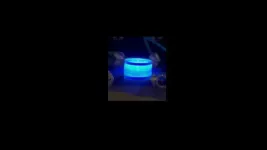(Press-News.org) DURHAM, N.C. – Mechanical engineers at Duke University have devised a new type of diagnostic platform that uses sound waves to spin an individual drop of water up to 6,000 revolutions per minute. These speeds separate tiny biological particles within samples to enable new diagnostics based on exosomes.
A very light disc placed on top of the spinning drop features etched channels that are equipped with star-shaped nanoparticles tailored to enable the label-free detection of specific disease-relevant bioparticles called exosomes. The technique is much more efficient than current approaches, requiring less time and sample volume while inflicting less damage to the delicate exosomes.
Exosomes are released by cells and carry cell-specific cargos of proteins, lipids and genetic materials, and can be selectively taken up by other cells as a means of communication. Their specific makeup has shown potential for use for non-invasive diagnostics.
Compared to the bulky machines that cost upwards of $100,000 that currently isolate these biomarkers, the technique could allow new point-of-care applications ranging from precision bioassays to cancer diagnosis.
The research appears online March 8 in the journal Science Advances.
“The most common way to separate exosomes is ultrasound centrifugation, which takes at least eight hours, needs large sample sizes and often damages the exosomes,” said Ty Naquin, a PhD student working in the laboratory of Tony Jun Huang, the William Bevan Distinguished Professor of Mechanical Engineering and Materials Science at Duke. “Other methods all have their problems as well, such as having low purity or low yield. Our initial demonstrations seem to provide a path to a better solution.”
The device centers on a drop of water placed within a ring of polydimethylsiloxane, a type of silicon commonly used in microfluidic technologies, which confines the water’s boundaries and keeps it in place. The researchers then placed a sound wave generator on each side of the device and slanted them so that sound waves travel through the underlying platform to enter the droplet.
The sound wave generators create surface acoustic waves that push on the sides of the droplet like Donald Duck getting blown over by a gigantic pair of speakers. At high enough powers, the droplet stabilizes and spins around thousands of times per minute.
“We went up to 6000 RPMs in the paper, but beyond that the droplet begins leaning and runs the risk of spitting water out and getting crushed by the disc sitting on top,” said Naquin.
The light disc placed on top features four channels etched into its surface. Rapid rotation causes exosomes to migrate to the ends of the channels while smaller proteins and other contaminants remain behind.
To detect the presence of specific biomarkers, the researchers turned to technology developed by Tuan Vo-Dinh, the R. Eugene and Susie E. Goodson Distinguished Professor of Biomedical Engineering and Professor of Chemistry at Duke.
His approach tethers DNA probes dubbed “Inverse Molecular Sentinels” to the points of star-shaped gold nanoparticles. While these tethers naturally want to curl up on themselves, they are held straight by a segment of DNA that is tailored to bind with the target microRNA being tested for. When that microRNA comes by on its exosome carrier, it sticks to and removes the DNA, allowing the tether to curl and bring the label molecule in close contact with the nanostar.
When exposed to a laser, that label molecule emits a light called a Raman signal, which is generally very weak. But the shape and composition of the nanostars amplifies Raman signals several million-fold, making them easier to detect.
“Our platform detected biomarkers for colorectal cancer patients with results that strongly correlate with the gold standard for this type of diagnostic but with much less time and effort required,” said Aidan Canning, a PhD student working in the Vo-Dinh laboratory. “This is such a great marriage of two technologies.”
While still in the early stages, Naquin and Canning are now thinking of new ways to wed these platforms with other advances for new types of investigations or commercialization.
“Our technology can discriminate between cancer and control groups with 95.8% sensitivity and 100% selectivity,” said Huang. “Its potential is enormous in fundamental biological research and the early diagnosis and health monitoring of cancers, neurodegenerative and other diseases.”
This work was supported by the National Institutes of Health (R01GM135486, R01GM132603).
“Acoustic separation and concentration of exosomes for nucleotide detection: ASCENDx.” Ty D. Naquin, Aidan J. Canning, Yuyang Gu, Jianing Chen, Chloe M. Naquin, Jianping Xia, Brandon Lu, Shujie Yang, Aleksandra Koroza, Katherine Lin, Hsin-Neng Wang, William R. Jeck, Luke P. Lee, Tuan Vo-Dinh, Tony Jun Huang. Science Advances, 8 Mar 2024, Vol 10, Issue 10. DOI: 10.1126/sciadv.adm8597
###
END
Water droplet spun by sound screens for colon cancer
New platform separates biomarkers with a water droplet-based centrifuge that spins up to 6000 RPM, pushed only by sound waves
2024-03-13
ELSE PRESS RELEASES FROM THIS DATE:
Study: Default testing for COVID-19 in K-12 schools more effective than voluntary testing
2024-03-13
CHAMPAIGN, Ill. — A new paper co-written by a team of University of Illinois Urbana-Champaign business professors found that default testing of K-12 students for COVID-19 during the pandemic could have saved up to one out of every five school days lost to the coronavirus during the fall 2021 semester.
Schools adopting an “opt-out model” – in which students were regularly tested for COVID-19 unless they proactively declined or “opted out” of testing – experienced a 30% lower positivity rate than schools ...
Poor sleep linked to migraine attacks in new UArizona Health Sciences study
2024-03-13
A new study by researchers at the University of Arizona Health Sciences identified a link between poor sleep and migraine attacks that suggests improving sleep health may diminish migraine attacks in people with migraine.
Many people with migraine report having sleeping disorders, including insomnia, trouble falling or staying asleep, poor sleep quality, excessive daytime sleepiness, waking up from sleep and being forced to sleep because of a migraine headache. Until now, it was unknown ...
Next generation stool DNA test has best detection rate of noninvasive colorectal cancer screening tools
2024-03-13
INDIANAPOLIS -- A study of more than 21,000 average risk patients at 186 sites across the U.S., led by Regenstrief Institute and Indiana University School of Medicine research scientist Thomas Imperiale, M.D., has found that the next generation multi-target stool DNA colorectal cancer screening test detects 94 percent of colorectal cancers. This test has the best performance for detection of both colorectal cancer and advanced precancerous polyps of any noninvasive colorectal cancer screening test.
Study results are published in the New England Journal of Medicine.
“We found that the next generation stool DNA test ...
Clinical study of a blood test shows 83% accuracy for detecting colorectal cancer
2024-03-13
SEATTLE — March 14, 2024 — A blood test intended for screening for colorectal cancer in people who are of average risk and not experiencing symptoms correctly detected colorectal cancer in 83% of people confirmed to have the disease, according to a study published March 14 in the New England Journal of Medicine.
The accuracy rate for colorectal cancer is similar to at-home stool tests used for early detection of colorectal cancer.
“The results of the study are a promising step toward developing more convenient tools to detect colorectal cancer early while it is more easily treated,” said corresponding ...
Preliminary clinical trial results show ‘dramatic and rapid’ regression of glioblastoma after next generation CAR-T therapy
2024-03-13
A collaborative project to bring the promise of cell therapy to patients with a deadly form of brain cancer has shown dramatic results among the first patients to receive the novel treatment. In a paper published today in The New England Journal of Medicine, researchers from the Mass General Cancer Center, a member of the Mass General Brigham healthcare system, shared the results for the first three patient cases from a phase 1 clinical trial evaluating a new approach to CAR-T therapy for glioblastoma (GBM). The trial, known as INCIPIENT, is designed to evaluate the safety of CARv3-TEAM-E T cells in patients with recurrent GBM. Just days after a single ...
Asian aerosols’ impact on Atlantic Meridional Overturning Circulation
2024-03-13
By Linh Truong
Since the Atlantic Meridional Overturning Circulation (AMOC) was first monitored in 2004, it has been the focus of thousands of scientific papers and even a blockbuster movie that grossed more than $552 million worldwide.
New research is hoping to add another twist to the current conversation.
Published in Nature Communications, Increased Asian Aerosols Drive a Slowdown of Atlantic Meridional Overturning Circulation identifies the effect of aerosols over Asia on the AMOC, a complex system of currents in the Atlantic Ocean.
Jian Lu, Earth scientist at the Department ...
Long COVID patients report improvements following self-regulation therapy, study finds
2024-03-13
A new UCLA-led study suggests that some people living with long COVID may be able to alleviate certain symptoms by using short-term, self-regulating therapies.
The small-scale study, published in the Journal of Psychosomatic Research, recruited a group of 20 long COVID patients, many of whom had been experiencing symptoms for more than a year. Each participant underwent six sessions of biofeedback therapy, which involves the practice of breathwork and relaxation techniques paired with visual feedback to teach self-regulation of autonomic functions such as heart rate and temperature.
Clinical psychologist Dr. Natacha Emerson, the study’s lead author and assistant clinical professor ...
Novel oral hormone therapy shows promising results for prostate cancer treatment with radiation therapy
2024-03-13
CLEVELAND - A high impact study led by Daniel Spratt, M.D., Vincent K. Smith Chair in Radiation Oncology at University Hospitals Seidman Cancer Center demonstrates the safety and efficacy of a novel oral hormone therapy, relugolix, in conjunction with radiation therapy for treating men with localized and advanced prostate cancer. This work is published in JAMA Oncology.
This research, encompassing an individual patient level analysis from two multinational randomized clinical trials, showcases relugolix's ability to rapidly achieve and maintain low testosterone levels, a necessary condition for some men’s prostate cancer treatment, in both short-term ...
Do astronauts experience “space headaches”?
2024-03-13
EMBARGOED FOR RELEASE UNTIL 4 P.M. ET, WEDNESDAY, MARCH 13, 2024
MINNEAPOLIS – Space travel and zero gravity can take a toll on the body. A new study has found that astronauts with no prior history of headaches may experience migraine and tension-type headaches during long-haul space flight, which includes more than 10 days in space. The study was published in the March 13, 2024, online issue of Neurology®, the medical journal of the American Academy of Neurology.
“Changes in gravity caused by space flight affect the function of many parts of the body, including the brain,” said study author W. P. J. van Oosterhout, MD, PhD, of Leiden University ...
Do veterans who experience concussions have an increased risk of Alzheimer’s?
2024-03-13
EMBARGOED FOR RELEASE UNTIL 4 P.M. ET, WEDNESDAY, MARCH 13, 2024
MINNEAPOLIS – Middle-age veterans who experienced concussions due to blasts from explosive devices may have biomarkers in their spinal fluid similar to people who develop Alzheimer’s disease, according to a new study published in the March 13, 2024, online issue of Neurology®, the medical journal of the American Academy of Neurology.
Traumatic brain injury (TBI) is caused by a bump, blow or jolt to the head or by an injury to the head caused by falls, motor vehicle ...
LAST 30 PRESS RELEASES:
Jeonbuk National University researchers develop an innovative prussian-blue based electrode for effective and efficient cesium removal
Self-organization of cell-sized chiral rotating actin rings driven by a chiral myosin
Report: US history polarizes generations, but has potential to unite
Tiny bubbles, big breakthrough: Cracking cancer’s “fortress”
A biological material that becomes stronger when wet could replace plastics
Glacial feast: Seals caught closer to glaciers had fuller stomachs
Get the picture? High-tech, low-cost lens focuses on global consumer markets
Antimicrobial resistance in foodborne bacteria remains a public health concern in Europe
Safer batteries for storing energy at massive scale
How can you rescue a “kidnapped” robot? A new AI system helps the robot regain its sense of location in dynamic, ever-changing environments
Brainwaves of mothers and children synchronize when playing together – even in an acquired language
A holiday to better recovery
Cal Poly’s fifth Climate Solutions Now conference to take place Feb. 23-27
Mask-wearing during COVID-19 linked to reduced air pollution–triggered heart attack risk in Japan
Achieving cross-coupling reactions of fatty amide reduction radicals via iridium-photorelay catalysis and other strategies
Shorter may be sweeter: Study finds 15-second health ads can curb junk food cravings
Family relationships identified in Stone Age graves on Gotland
Effectiveness of exercise to ease osteoarthritis symptoms likely minimal and transient
Cost of copper must rise double to meet basic copper needs
A gel for wounds that won’t heal
Iron, carbon, and the art of toxic cleanup
Organic soil amendments work together to help sandy soils hold water longer, study finds
Hidden carbon in mangrove soils may play a larger role in climate regulation than previously thought
Weight-loss wonder pills prompt scrutiny of key ingredient
Nonprofit leader Diane Dodge to receive 2026 Penn Nursing Renfield Foundation Award for Global Women’s Health
Maternal smoking during pregnancy may be linked to higher blood pressure in children, NIH study finds
New Lund model aims to shorten the path to life-saving cell and gene therapies
Researchers create ultra-stretchable, liquid-repellent materials via laser ablation
Combining AI with OCT shows potential for detecting lipid-rich plaques in coronary arteries
SeaCast revolutionizes Mediterranean Sea forecasting with AI-powered speed and accuracy
[Press-News.org] Water droplet spun by sound screens for colon cancerNew platform separates biomarkers with a water droplet-based centrifuge that spins up to 6000 RPM, pushed only by sound waves




